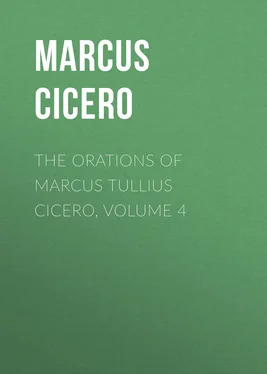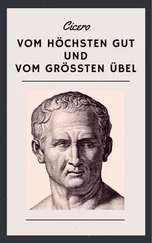Marcus Cicero - The Orations of Marcus Tullius Cicero, Volume 4
Здесь есть возможность читать онлайн «Marcus Cicero - The Orations of Marcus Tullius Cicero, Volume 4» — ознакомительный отрывок электронной книги совершенно бесплатно, а после прочтения отрывка купить полную версию. В некоторых случаях можно слушать аудио, скачать через торрент в формате fb2 и присутствует краткое содержание. Жанр: foreign_antique, Философия, foreign_edu, на английском языке. Описание произведения, (предисловие) а так же отзывы посетителей доступны на портале библиотеки ЛибКат.
- Название:The Orations of Marcus Tullius Cicero, Volume 4
- Автор:
- Жанр:
- Год:неизвестен
- ISBN:нет данных
- Рейтинг книги:3 / 5. Голосов: 1
-
Избранное:Добавить в избранное
- Отзывы:
-
Ваша оценка:
- 60
- 1
- 2
- 3
- 4
- 5
The Orations of Marcus Tullius Cicero, Volume 4: краткое содержание, описание и аннотация
Предлагаем к чтению аннотацию, описание, краткое содержание или предисловие (зависит от того, что написал сам автор книги «The Orations of Marcus Tullius Cicero, Volume 4»). Если вы не нашли необходимую информацию о книге — напишите в комментариях, мы постараемся отыскать её.
The Orations of Marcus Tullius Cicero, Volume 4 — читать онлайн ознакомительный отрывок
Ниже представлен текст книги, разбитый по страницам. Система сохранения места последней прочитанной страницы, позволяет с удобством читать онлайн бесплатно книгу «The Orations of Marcus Tullius Cicero, Volume 4», без необходимости каждый раз заново искать на чём Вы остановились. Поставьте закладку, и сможете в любой момент перейти на страницу, на которой закончили чтение.
Интервал:
Закладка:
VIII. But who is there who can consider Marcus Antonius a citizen, rather than a most foul and barbarous enemy, who, while sitting in front of the temple of Castor, in the hearing of the Roman people, said that no one should survive except those who were victorious? Do you suppose, O conscript fathers, that he spoke with more violence than he would act? And what are we to think of his having ventured to say that, after he had given up his magistracy, he should still be at the city with his army? that he should enter the city as often as he pleased? What else was this but threatening the Roman people with slavery? And what was the object of his journey to Brundusium? and of that great haste? What was his hope, except to lead that vast army to the city, or rather into the city? What a proceeding was that selection of the centurions! What unbridled fury of an intemperate mind! For when those gallant legions had raised an outcry against his promises, he ordered those centurions to come to him to his house, whom he perceived to be loyally attached to the republic, and then he had them all murdered before his own eyes and those of his wife, whom this noble commander had taken with him to the army. What disposition do you suppose that this man will display towards us whom he hates, when he was so cruel to those men whom he had never seen? And how covetous will he be with respect to the money of rich men, when he thirsted for even the blood of poor men? whose property, such as it was, he immediately divided among his satellites and boon companions.
And he in a fury was now moving his hostile standards against his country from Brundusium, when Caius Caesar, by the kind inspiration of the immortal gods, by the greatness of his own heavenly courage, and wisdom, and genius, of his own accord, indeed, and prompted by his own admirable virtue, but still with the approbation of my authority, went down to the colonies which had been founded by his father; convoked the veteran soldiery; in a few days raised an army; and checked the furious advance of this bandit. But after the Martial legion saw this admirable leader, it had no other thoughts but those of securing our liberty. And the fourth legion followed its example.
IX. And Antonius, on hearing of this news, after he had summoned the senate, and provided a man of consular rank to declare his opinion that Caius Caesar was an enemy of his country, immediately fainted away. And afterwards, without either performing the usual sacrifices, or offering the customary vows, he, I will not say went forth, but took to flight in his robe as a general. But which way did he flee? To the province of our most resolute and bravest citizens; men who could never have endured him if he had not come bringing war in his train, an intemperate, passionate, insolent, proud man, always making demands, always plundering, always drunk. But he, whose worthlessness even when quiet was more than any one could endure, has declared war upon the province of Gaul; he is besieging Mutina, a valiant and splendid colony of the Roman people; he is blockading Decimus Brutus, the general, the consul elect, a citizen born not for himself, but for us and the republic. Was then Hannibal an enemy, and is Antonius a citizen? What did the one do like an enemy, that the other has not done, or is not doing, or planning, and thinking of? What was there in the whole of the journey of the Antonii; except depopulation, devastation, slaughter, and rapine? Actions which Hannibal never did, because he was reserving many things for his own use, these men do, as men who live merely for the present hour; they never have given a thought not only to the fortunes and welfare of the citizens, but not even to their own advantage.
Are we then, O ye good gods, to resolve to send ambassadors to this man? Are those men who propose this acquainted with the constitution of the republic, with the laws of war, with the precedents of our ancestors? Do they give a thought to what the majesty of the Roman people and the severity of the senate requires? Do you resolve to send ambassadors? If to beg his mercy, he will despise you; if to declare your commands he will not listen to them; and last of all, however severe the message may be which we give the ambassadors, the very name of ambassadors will extinguish this ardour of the Roman people which we see at present, and break the spirit of the municipal towns and of Italy. To say nothing of these arguments, though they are weighty, at all events that sending of an embassy will cause delay and slowness to the war. Although those who propose it should say, as I hear that some intend to say,—"Let the ambassadors go, but let war be prepared for all the same." Still the very name of ambassadors will damp men's courage, and delay the rapidity of the war.
X. The most important events, O conscript fathers, are often determined by very trivial moving influences in every circumstance that can happen in the republic, and also in war, and especially in civil war, which is usually governed a great deal by men's opinions and by reports. No one will ask what is the commission with which we have sent the ambassadors; the mere name of an embassy, and that sent by us of our own accord, will appear an indication of fear. Let him depart from Mutina; let him cease to attack Brutus; let him retire from Gaul. He must not be begged in words to do so; he must be compelled by arms. For we are not sending to Hannibal to desire him to retire from before Saguntum; to whom the senate formerly sent Publius Valerius Flaccus and Quintus Baebius Tampilus; who, if Hannibal did not comply, were ordered to proceed to Carthage. Whither do we order our ambassadors to proceed, if Antonius does not comply? Are we sending an embassy to our own citizen, to beg him not to attack a general and a colony of the Roman people? Is it so? Is it becoming to us to beg this by means of ambassadors? What is the difference, in the name of the immortal gods, whether he attacks this city itself, or whether he attacks an outpost of this city, a colony of the Roman people, established for the sake of its being a bulwark and protection to us? The siege of Saguntum was the cause of the second Punic war, which Hannibal carried on against our ancestors. It was quite right to send ambassadors to him. They were sent to a Carthaginian, they were sent on behalf of those who were the enemies of Hannibal, and our allies. What is there resembling that case here? We are sending to one of our own citizens to beg him not to blockade a general of the Roman army, not to attack our army and our colony,—in short, not to be an enemy of ours. Come; suppose he obeys, shall we either be inclined, or shall we be able by any possibility, to treat him as one of our citizens?
XI. On the nineteenth of December, you overwhelmed him with your decrees; you ordained that this motion should be submitted to you on the first of January, which you see is submitted now, respecting the honours and rewards to be conferred on those who have deserved or do deserve well of the republic. And the chief of those men you have adjudged to be the man who really has done so, Caius Caesar, who had diverted the nefarious attacks of Marcus Antonius against this city, and compelled him to direct them against Gaul; and next to him you consider the veteran soldiers who first followed Caesar; then those excellent and heavenly-minded legions the Martial and the fourth, to whom you have promised honours and rewards, for having not only abandoned their consul, but for having even declared war against him. And on the same day, having a decree brought before you and published on purpose, you praised the conduct of Decimus Brutus, a most excellent citizen, and sanctioned with your public authority this war which he had undertaken of his own head.
What else, then, did you do on that day except pronounce Antonius a public enemy? After these decrees of yours, will it be possible for him to look upon you with equanimity, or for you to behold him without the most excessive indignation? He has been excluded and cut off and wholly separated from the republic, not merely by his own wickedness, as it seems to me, but by some especial good fortune of the republic. And if he should comply with the demands of the ambassadors and return to Rome, do you suppose that abandoned citizens will ever be in need of a standard around which to rally? But this is not what I am so much afraid of. There are other things which I am more apprehensive of and more alarmed at. He never will comply with the demands of the ambassadors. I know the man's insanity and arrogance; I know the desperate counsels of his friends, to which he is wholly given up. Lucius his brother, as being a man who has fought abroad, leads on his household. Even suppose him to be in his senses himself, which he never will be; still he will not be allowed by these men to act as if he were so. In the mean time, time will be wasted. The preparations for war will cool. How is it that the war has been protracted as long as this, if it be not by procrastination and delay?
Читать дальшеИнтервал:
Закладка:
Похожие книги на «The Orations of Marcus Tullius Cicero, Volume 4»
Представляем Вашему вниманию похожие книги на «The Orations of Marcus Tullius Cicero, Volume 4» списком для выбора. Мы отобрали схожую по названию и смыслу литературу в надежде предоставить читателям больше вариантов отыскать новые, интересные, ещё непрочитанные произведения.
Обсуждение, отзывы о книге «The Orations of Marcus Tullius Cicero, Volume 4» и просто собственные мнения читателей. Оставьте ваши комментарии, напишите, что Вы думаете о произведении, его смысле или главных героях. Укажите что конкретно понравилось, а что нет, и почему Вы так считаете.












